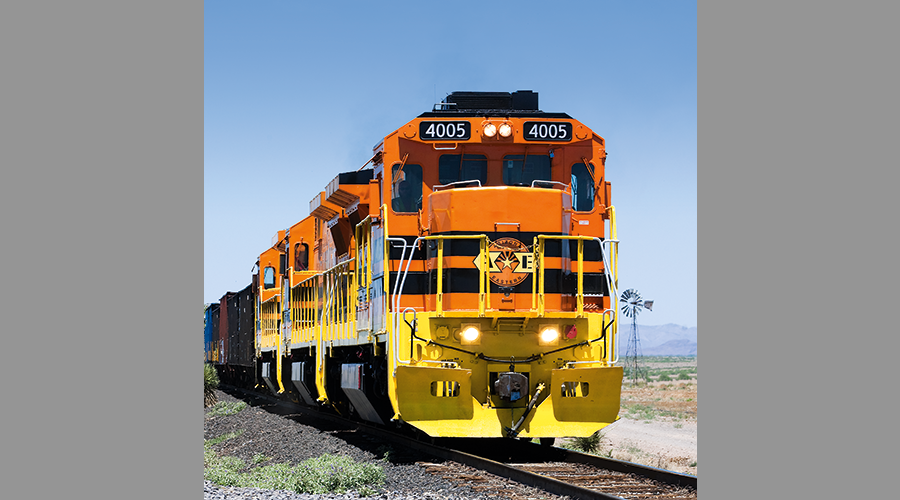Stay updated on news, articles and information for the rail industry
January 2014
Rail News: Short Lines & Regionals
Building a safety culture on a West Africa short-line railroad (guest comment)
|
Ron Mitchell (left) leads the Heavy Haul Rail and Road Systems practice of Ausenco in Perth, Australia, and Vancouver, British Columbia, Canada; and Rob Close (right) is general manager, Health, Safety, Environment and Community, in Ausenco's Vancouver office. |
|
Senegal, West Africa, is a place without much safety culture. Truck loading crews are expected to ride on the vehicle's bumper. Few employers provide hard hats. And the philosophy is "whatever it takes" for getting the job done. However, in a project involving a short-line railroad in Senegal, we were able to achieve 4 million person-hours without any lost-time incidents (LTIs).
Ausenco is a Brisbane, Australia-based provider of engineering and project management services. Ausenco's portion of the project in question involved repairing 110 kilometers of existing one-meter gauge railroad, adding 25 kilometers of new track and building an export facility in Dakar. All of the track crossovers and loop ends (siding turnouts) had to be replaced, and there was extensive sleeper (crosstie) replacement.
For this project, Ausenco supplied engineering and procurement services from Vancouver, British Columbia, Canada, and construction and safety management personnel from around the world. All personnel joined the mining company, Grande Côte Operations S.A. (GCO), in GCO's desire to have a healthy and safe workforce. Steps that Ausenco and GCO took to build a safety culture along with a railroad are applicable in any part of the world. The philosophy we followed was that safety is everyone's business — that everyone on the site, at whatever level, has both the right and the obligation to report unsafe situations and practices. Some success factors:
- Corporate support: It was vital that everyone from the top down of both the client and consultant accept that the safest way to work is not always the cheapest or the fastest, at least in the short run.
- Invest in supervision: Building a worksite safety culture won't happen unless there is a strong cadre of onsite supervision able to find safe ways to work; instill those ways in the workforce; check to see that safety is being observed; correct unsafe situations; and provide sanctions for those who do not observe safe conduct and reward those who do. This meant investing in a higher-than-usual level of supervision.
- Effective job planning: One of the contributors to unsafe situations is having employees responsible for too many different tasks. Simplification helps — for example, to repair existing track, one team removed sleepers, another installed them and another carried rail. It meant less confusion on the job site.
- Safety briefings: Railroads have long employed tailgate meetings. Imagine conducting these briefings in three languages (English, French and Wolof). It was necessary to follow up on every communication to ensure complete understanding.
- Effective sanctions for unsafe behavior: We insisted that everyone, from top management on down, observe safe behavior. It was vital that all employees see that unsafe actions and situations would bring sanctions, no matter who was responsible.
- Effective rewards: Each time we had a safety-related success — such as a number of hours passed without injury — we had a celebration in which everyone could share. Even a special dessert in the canteen, or handing out prepaid phone cards, can highlight the importance of safety.
- Invest in safety equipment: Although it is important to eliminate unsafe situations, it is also important to limit injuries through personal protective equipment such as hard hats and gloves.
- Learn from mistakes: While stressing each of the above points and the importance of achieving goals like a LTI-free workplace, GCO Project Manager Adam Smits said: "Shortly after congratulating ourselves over passing the 4 million LTI-free milestone, a mammoth achievement that we were all proud of ... we had two incidents that brought us back down to earth. One was due to an unsafe situation that all of us had been walking past for months without noticing an accident waiting to happen. The other injury was to a worker who, with unusual resolve, managed to disregard the safety measures and controls that had been put in place for the task at hand, including backups to those safety measures. It brought home the realization that there is always room for improvement in the most successful of safety programs."
Keywords
Browse articles on safety culture rail safety Ausenco short line shortlineContact Progressive Railroading editorial staff.


 2025 MOW Spending Report: Passenger-rail programs
2025 MOW Spending Report: Passenger-rail programs
 Gardner steps down as Amtrak CEO
Gardner steps down as Amtrak CEO
 Guest comment: Oliver Wyman’s David Hunt
Guest comment: Oliver Wyman’s David Hunt
 Women of Influence in Rail eBook
Women of Influence in Rail eBook
 railPrime
railPrime








